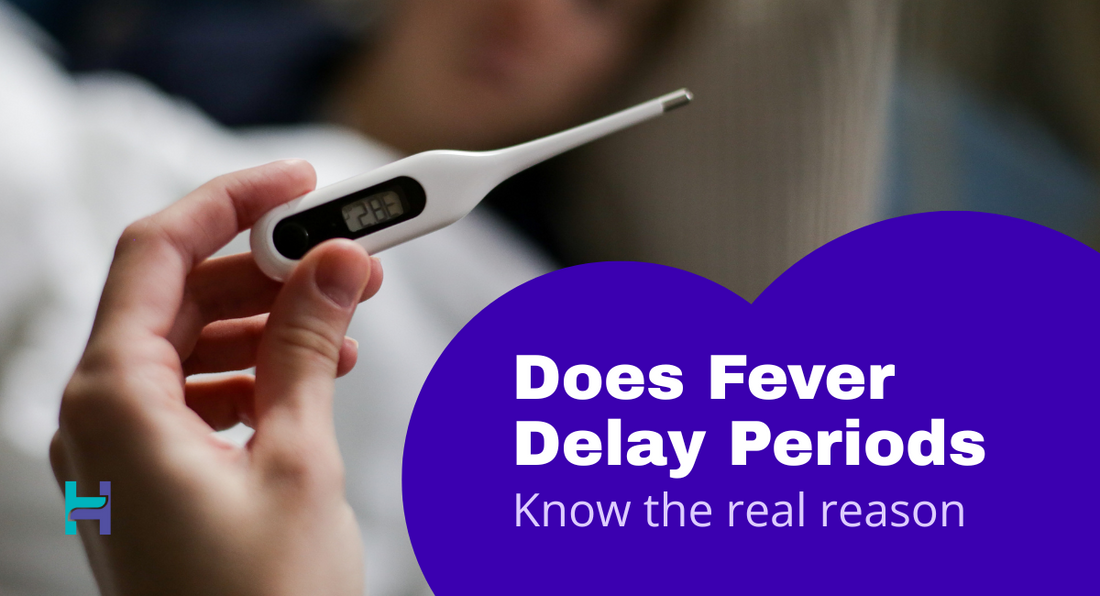Key Takeaways:
- Yes, fever can lead to delay in your period by 3-7 days (sometimes up to 2 weeks) as your body prioritizes fighting infection over the menstrual cycle
- Illness disrupts your hormone balance through the hypothalamus, affecting when you ovulate
- Stress, poor sleep, and dehydration during sickness add to delays
- Your body naturally resolves most delays as you recover
- Visit a doctor if your period runs over 14 days late or delays happen frequently
You wait for your period, but it doesn’t come.
You had a fever last week. Now your period is late. This can feel confusing, especially if your cycle is usually regular.
The question comes up — can fever cause a delay in periods?
Yes, it can. When you have a fever, your body goes into repair mode. It focuses all its energy on fighting the infection. As a result, other systems like the menstrual cycle slow down. This can cause your period to come late or sometimes even skip a cycle.
Your body treats fever as a form of stress. That stress impacts the brain, especially the part that controls your hormones. Once that balance is disturbed, your cycle gets delayed. This delay is common and usually nothing to worry about. Most women will notice their period arrive once the fever passes and the body recovers.
Fever affects hormones that control your cycle
Your period depends on a delicate balance of hormones. These hormones are controlled by the hypothalamus, a part of your brain. When you get a fever, the hypothalamus gets affected. It may stop sending signals on time. This can delay ovulation. If ovulation is delayed, your period will also get pushed forward.
Fever is not the only factor here. Poor sleep, loss of appetite, dehydration, and general weakness after illness, all add to the problem. Your body puts reproduction on hold while it heals. That’s why periods often get delayed after fever or any serious illness.
You may notice other changes too. Your period may come with less flow, or more pain, or arrive unexpectedly. These are signs that your hormones are still settling.
Usually, everything returns to normal within one or two cycles.
A large population-based study found that younger women with asthma and allergies are more likely to experience irregular periods.
Researchers followed 6,137 women aged 26–54 across five European countries and found a clear link between asthma, hay fever, and menstrual irregularities—especially in women under 42.
Fever and your menstrual cycle
It’s been over a week, and your period is still missing. You feel bloated, tired, and worried. This delay makes you anxious. You start checking your dates again and again.
You try to remember if you missed anything. Your body feels fine now, but your cycle hasn’t caught up.
This situation is stressful. And stress can delay your period even further. It becomes a loop.
First, the fever delays your cycle. Then, your stress adds to the delay.
You feel stuck.
What you need now is clarity. You want to know how long this can go on. You also want to know when it’s time to worry. The good news is that short-term delays are normal. But if it continues, you must act.
How long can fever delay periods?
In most cases, fever delays your period by 3 to 7 days. Sometimes, it can stretch to two full weeks. The exact delay depends on how strong the fever was and how quickly you recovered. A high-grade fever or viral infection can throw off your cycle more than a mild one.
Even after the fever goes away, your body takes time to regain balance. Hormone levels don’t return to normal overnight. That’s why your cycle may still feel off in the weeks that follow.
If your period hasn’t started even after 14 days, take a pregnancy test, especially if you’re sexually active. If the result is negative and your cycle is still missing, talk to a doctor. Long-term irregular periods could point to thyroid issues, PCOS, or other hormone problems.

Other reasons your period might be late
Fever isn’t the only thing that can delay your period. Here are a few things that can affect your hormones.
- Stress
- Poor sleep
- Travel
- Weight changes
- PCOS
- Thyroid issues
- New medicines
- Pregnancy
Your body reacts to every change.
Sometimes, new medications — especially steroids or antibiotics — can also affect the cycle. And of course, pregnancy is always a possibility if you’re sexually active.
That’s why it’s important to track your cycle regularly. When you do that, you’ll know what’s normal for your body and what’s not. A one-time delay is okay. But if it becomes frequent, you need to look deeper.
How to handle a late period after fever
Start by giving your body time. Focus on rest, hydration, and nutrition. Your body needs to recover, and your hormones need to reset.
Don't panic if your period is a week late after a fever. This is common and usually harmless.
If you’ve had unprotected sex, take a pregnancy test after a week’s delay. If it’s negative, wait another few days. Still no period? Then it’s time to see your doctor. Avoid taking pills to force your period unless prescribed. Doing so can disturb your hormones further.
Instead, wait for your body to heal naturally. Eat healthy foods, get 7–8 hours of sleep, and avoid stress.
If delays keep happening month after month, ask your doctor for a hormone check or a thyroid test. Early treatment can prevent long-term issues.
Summary
Fever stresses your body. It shifts energy away from reproduction and focuses on healing. This can delay your periods. Most delays last a few days to two weeks. They usually fix themselves once your body recovers.
But always stay alert. Track your period every month. Know your cycle. If your period delays often or skips completely, get medical advice. Don’t ignore what your body is telling you.
Your menstrual cycle is a sign of your overall health. Listen to it.
Frequently asked questions
Q. Can Fever delay your period?
Yes, fever can delay your period. Fever puts stress on your body. This stress affects hormone signals from the brain. It delays ovulation. When ovulation gets delayed, your period comes late.
Q. How late Is too late for a period?
A period is too late if it’s over 14 days late. Take a pregnancy test if you’re sexually active. If the test is negative, talk to a doctor. Repeated delays may signal hormone issues or medical conditions like PCOS or thyroid problems.
Q. Does cold and flu affect your period?
Yes, cold and flu can affect your period. Your body sees illness as stress. This stress can disturb hormone levels. It may delay ovulation or change your period flow. Your cycle usually returns to normal after recovery.
References
- Baker, F. C., Siboza, F., & Fuller, A. (2020). Temperature regulation in women: Effects of the menstrual cycle. Temperature (Austin), 7(3), 226-262. https://doi.org/10.1080/23328940.2020.1735927 Available from - https://pubmed.ncbi.nlm.nih.gov/33123618/
- Svanes C, Real FG, Gislason T, Jansson C, Jögi R, Norrman E, Nyström L, Torén K, Omenaas E. Association of asthma and hay fever with irregular menstruation. Thorax. 2005 Jun;60(6):445-50. doi: 10.1136/thx.2004.032615. PMID: 15923242; PMCID: PMC1747439. Available from - https://pubmed.ncbi.nlm.nih.gov/15923242/


